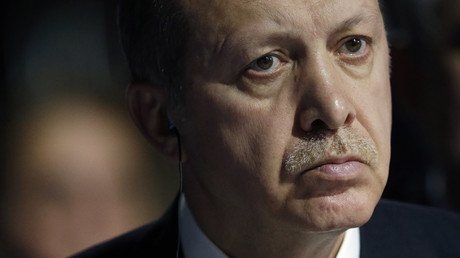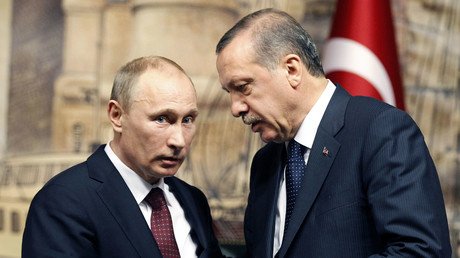Putin to have phone conversation with Erdogan on Wednesday
President Vladimir Putin will have a phone conversation with his Turkish counterpart, Recep Tayip Erdogan, on Wednesday – the first since Russia-Turkey relations became strained after last year’s downing of a Russian jet over Syria, the Kremlin reports.
“The phone conversation between President Putin and President Erdogan will take place tomorrow [on Wednesday], initiated by Russia,” Kremlin spokesman Dmitry Peskov told reporters on Tuesday.
On Monday, Erdogan sent a letter to President Putin to offer his apologies for the death of a Russian pilot who was killed when his jet was downed over the Syrian-Turkish border. “The head of the Turkish state expressed his deep sympathy and condolences to the relatives of the deceased Russian pilot and said ‘sorry,’” Peskov said.
Russian-Turkish ties have seen a dramatic decline since last November when a Russian Su-24M bomber was shot down by a Turkish F16. A pilot died when shot while parachuting to the ground and a marine was killed in action during a rescue mission to save the surviving co-pilot.
The act of aggression prompted a quick response from Moscow, with Russia’s leader calling it “a stab in the back.” Economic sanctions restricting agricultural exports and tourism were imposed on Turkey almost immediately thereafter.
The Kremlin sees Erdogan’s message as an important step forward in bilateral relations, but there is still much to be done, according to Peskov.
“Indeed, we will have to make more than one step towards each other,” he said. “There’s no reason to believe everything would be settled within several days, but we will work on this.”
#Erdogan apologizes to #Putin over Russian pilot's death, calls Russia 'friend'. Watch here: https://t.co/TRw1Yq8lgRhttps://t.co/0DShA0iWbg
— RT (@RT_com) June 27, 2016
He did not elaborate on whether President Putin would reply to Erdogan’s letter, but confirmed that the Turkish leader had literally used the word “sorry” without “philological intricacies.”
Both Erdogan’s letter and the upcoming telephone conversation follow nearly eight months of heightened tensions between Moscow and Ankara. Russia has demanded that Turkey apologize for the aircraft incident, reimburse the costs, and bring those involved in killing the pilot to justice, while Ankara has long refused to accede to those demands.
In the meantime, Turkey’s president has made several attempts to contact Putin, the most recent coming in June, when Erdogan congratulated "all Russians on Russia Day," expressing hope "that the relations between Russia and Turkey will rise to the deserved level."
Turkish Prime Minister Binali Yildirim also wrote a separate letter to his Russian counterpart, Dmitry Medvedev, saying, “In the near future, cooperation and relations between the two countries will reach a level that is essential for the common interests of our peoples.”
Yildirim told reporters in the parliament on Tuesday that Ankara will not reimburse Russia for the downed jet. However, just a day earlier, he had said that Turkey was ready to pay compensation "if necessary," claiming that both Moscow and Ankara "will put this incident behind us and continue on our path."
On Friday, Turkish Foreign Minister Mevlut Cavusoglu is expected to meet Russian counterpart Sergey Lavrov in Sochi, southern Russia, where a meeting of the Organization of the Black Sea Economic Cooperation (BSEC) will take place.
Last Thursday, Russian Deputy FM Vassily Nebenzia announced that Turkey had been invited to the BSEC meeting with the option of having face-to-face talks between the two foreign ministers, although the organization’s format allows no bilateral meetings.














